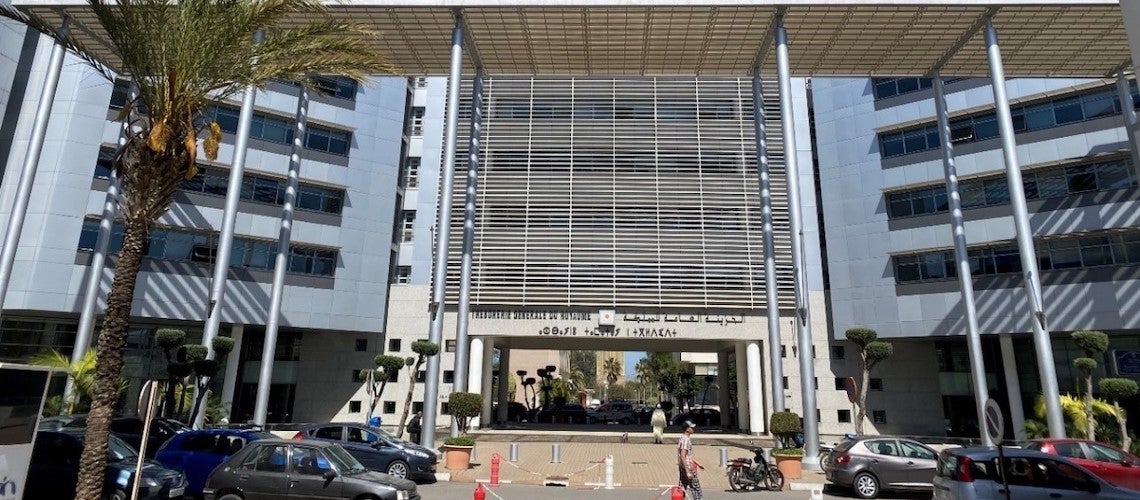 Traffic passes in front of the Trésorerie Générale du Royaume (TGR) offices in charge of public procurement in Morocco.
Traffic passes in front of the Trésorerie Générale du Royaume (TGR) offices in charge of public procurement in Morocco.
Sometimes, simple reforms have a big impact.
We work in an institution which is putting the fight against climate change at the heart of its mandate – together with our work to eliminate extreme poverty and strive for equitable development in the client countries we serve. The World Bank Group's Climate Change Action Plan 2021-2025 has a target that over 35% of WBG financing will work to address climate mitigation or adaptation.
In Morocco, a quiet reform is contributing to this goal: digitizing public procurement.
Public procurement in Morocco represents 20% of GDP with over 40,000 tenders every year. Until recently, all bidders across the country had to physically participate in the process. This meant going back and forth from the local procurement office to collect bidding documents, obtain a bank guarantee, submit bids, participate in the bid opening, submit further documentation after notification of contract award, and sign a contract.
This represented a significant amount of road trips for any bidder (in total, 12 road trips of about 60 km each, or 720 km for one bidder), leading not only to vast carbon emissions, but also to lost time and money, which is a disincentive for small and medium enterprises (SMEs) to participate in public procurement. The goal of having 30% of public tenders allocated to SMEs, enshrined in the law, seemed hard to reach and facilitating the participation of SMEs (with a full electronic process) is one among other actions that governments can adopt to achieve it.
So as a solution, the World Bank supported Morocco’s policy reforms to digitize public procurement by moving all physical processes for firms to bid on public procurement tenders online, as part of our Financial and Digital Inclusion budget support program. Morocco’s journey to digitizing public tenders started in 2007 with the launch of an electronic procurement portal which allowed for electronic submissions, e-reverse auctions, and e-tendering.
However, firms lacked trust and familiarity with electronic procedures, and the transition to electronic submissions by firms required a large change management and capacity-building program by Trésorerie Générale du Royaume (TGR) to help firms embrace the technological advance. And without the use of electronic submissions, there was no data to show whether SMEs effectively benefited from public contracts. Between 2020 and 2022, the Government issued three regulations to: i) mandate that all public procuring entities must publish the number and value of contracts awarded to SMEs; ii) mandate that all bidders who submit their bids for public tenders must go through the public procurement portal; and iii) digitize the bank guarantees.
E-procurement is thus eco-friendly; it can drive demand for sustainable products and services and create a market for different ‘green’ solutions. By mandating electronic submissions, public buyers promote sustainable business practices and reduce carbon emissions. The percentage of bids submitted electronically increased from 15% in December 2019, before the reforms, to 68% in June 2022, and the goal of the Government is to reach 100% by August 2023.
Digitalizing the procurement process had a strong impact on reducing carbon emissions, even when considering the increased energy use for data usage and storage. Considering 40,000 tenders annually, and an average of 4 bidders per tender, the reform reduced vendors’ road trips from 22 to 2 per tender with only the contract signing left physically for the winning bidder. The full implementation of the reform is expected to reduce the distance travelled for all bidders in one year from 86,000 km to just 6,000 km, and CO2 emissions by 84%.
What’s next?
More steps are needed to move from e-procurement to green procurement, whereby the public administration effectively reduces its own carbon footprint from what it purchases. The Bank is supporting the Moroccan government in adopting a Green Procurement charter and introducing green criteria in the e-Procurement Platform, so that public entities buy goods that meet certain environmental standards.
As for the goal to benefit SMEs, as of June 2022, only 11% of annual procurement was awarded to SMEs. A key issue for SMEs is payment delays, and the Government has reduced them from 42 days in 2019 to 34 days in 2022 according to the Observatoire des délais de paiements.
E-procurement supports climate change mitigation, but another vital outcome is that it supports transparency, fairness, good governance and increases competition. By leveraging digital technologies, electronic government procurement enhances accountability, helps prevent corruption, and promotes sustainable practices.




Join the Conversation